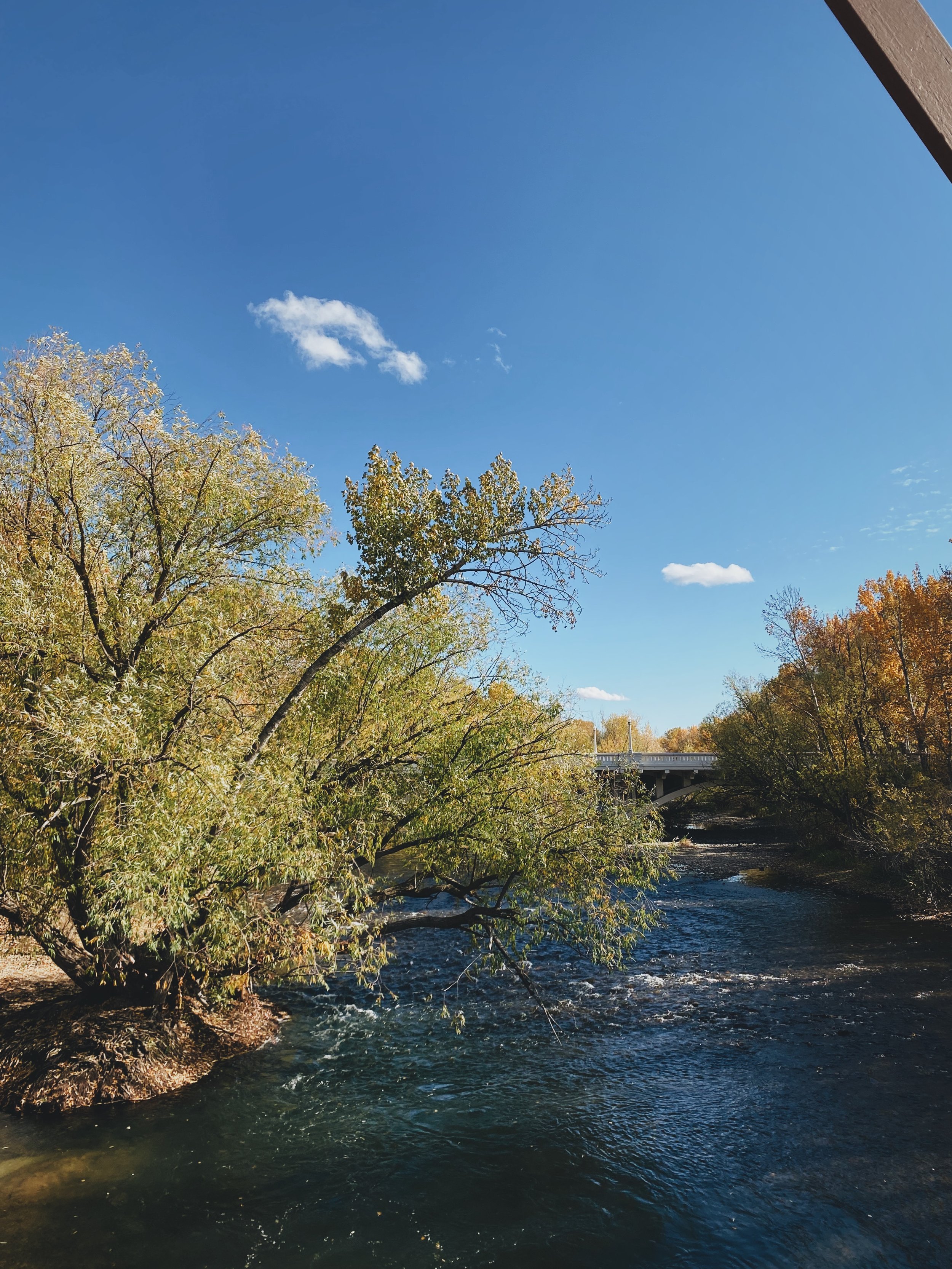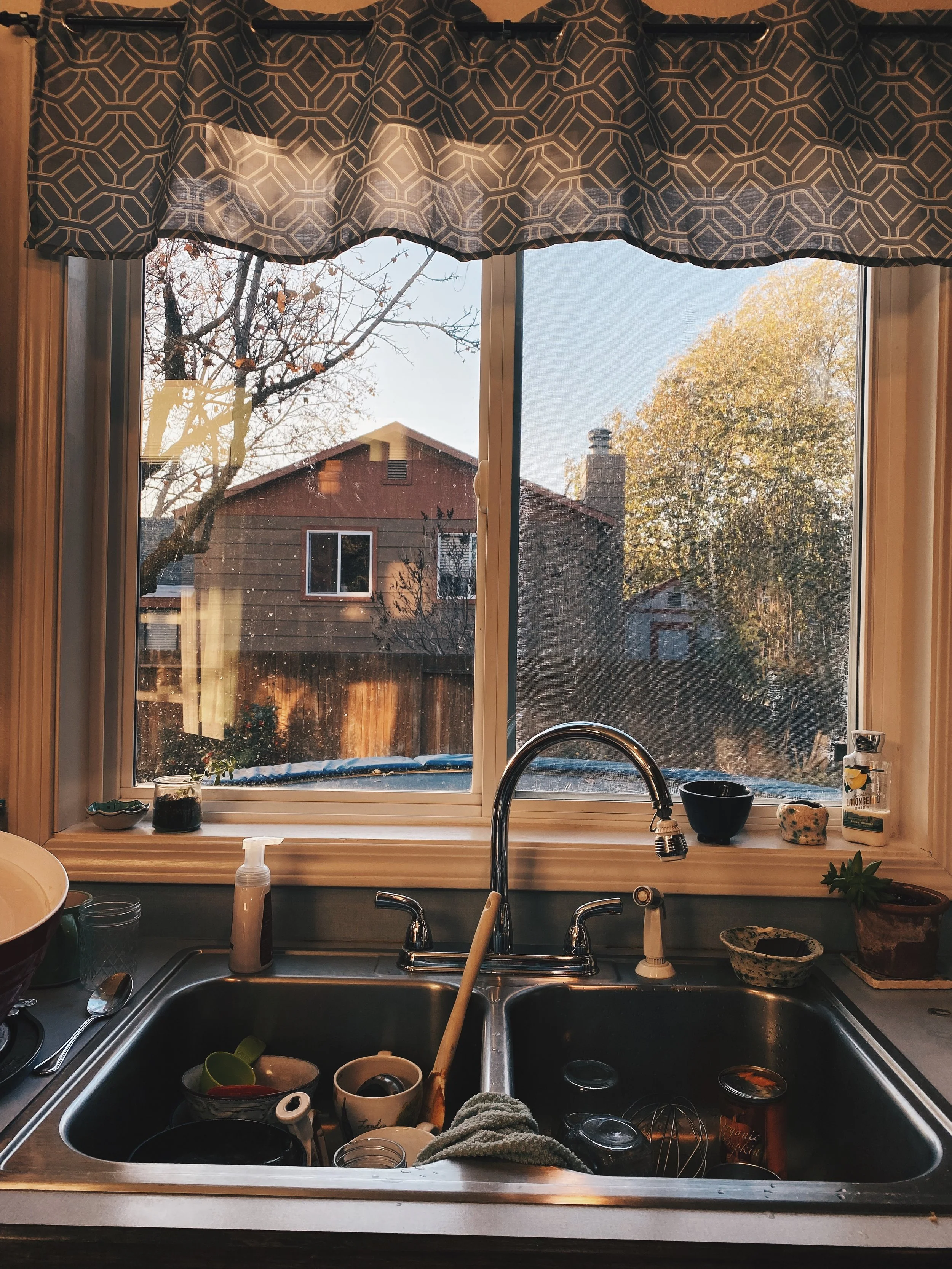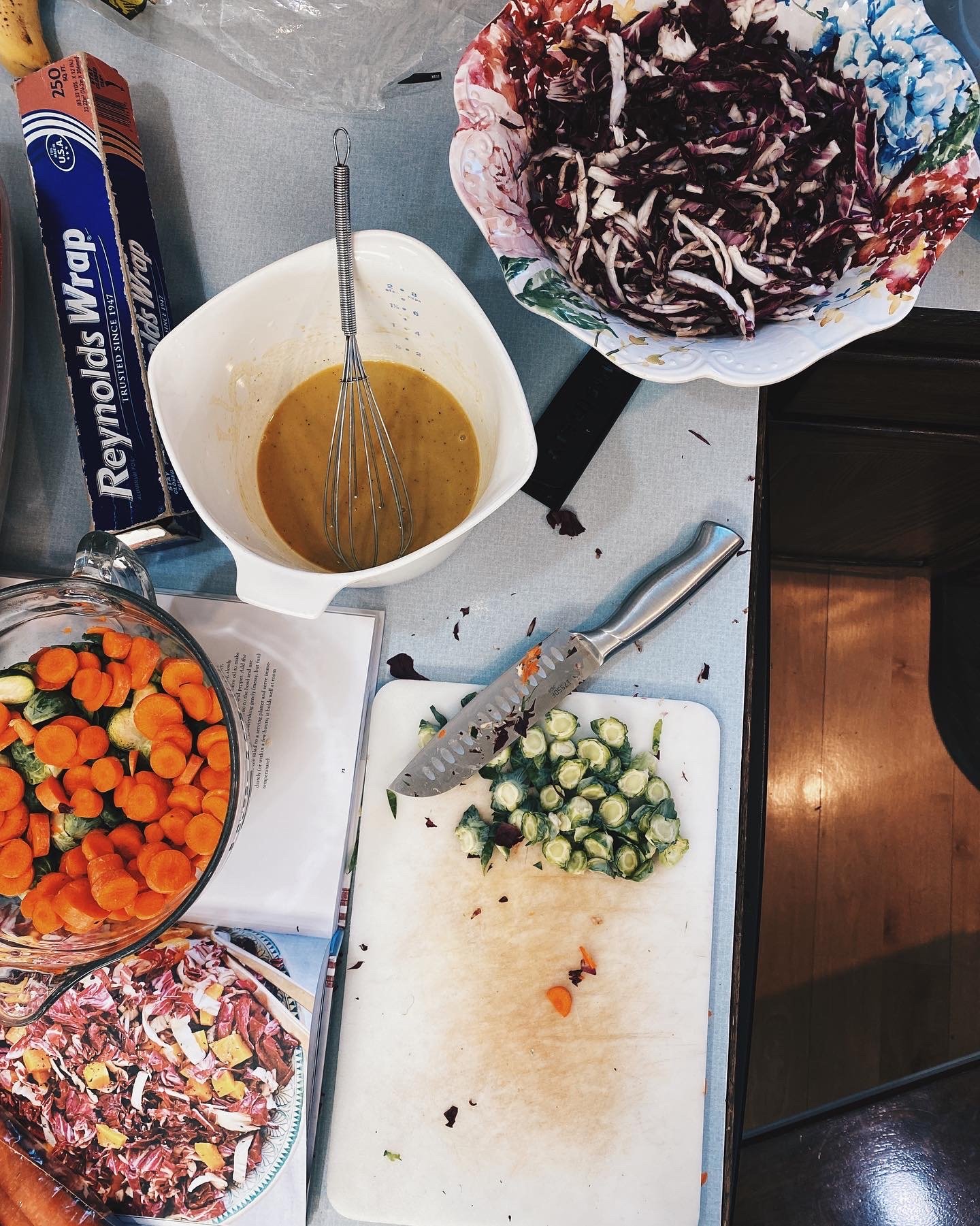wild, overflowing spring (on abundance)
my river, late october
here I am again, weeping outside your gate, with a prayer, a dream, sure that what I want will make everything okay, or at least, better. I can’t fathom that you want me. my longings take up all the space.hannah, before samuel
here I am again, at this well in the middle of the blistering, smoky afternoon. I am so tired of this, of the thirst and of the coming alone. but today, amid the irk and the deep sadness you are here, strange man at the well—I am met in the ordinary, by your gentle eyes so different from my wild spirit. may I watch you with a holy curiosity, look up at you and say “yes.”the samaritan woman, at the well
I’m on the edge of my seat as the sermon ends, staring down at my dry, folded hands in my lap as the music plays. People around me stand up, one by one, forming a line down the center aisle as they walk to the front to take communion, plucking the individually wrapped wafer and juice from the tiny wicker basket. (Side note: If you’re a churchgoer, then you know the replacement of the traditional elements with the sorry excuse for bread and wine in the small self-serve plastic container is arguably one of the worst fall outs of the pandemic.)
Usually, I linger before going forward, taught as a child to use this as a time of confession and drawing near to God. Now, as an adult, I savor the quiet space to meditate on the incredible miracle and goodness of the Lord, the fleshy, almost graphic imagery of being asked to eat the body and blood of Jesus, as it’s easy for the familiar phrases and liturgy to fade into meaningless repetition.
However, this particular Sunday, as I hum in harmony to the music, turning inward in reflection, I look at the small basket holding the cups, and I have a thought I’ve never had before: What if they run out? What if there aren’t enough left for me?
Immediately, I trade in the quiet moment for a certainty of nourishment, the fear of being left with nothing overriding my desire for actual communion with God. As I sit back down, I think:
How much has this fear of “not enough” permeated my life? And how is this radically changing my actions?
Months have passed since this Sunday in August, but I haven’t been able to stop thinking about these ideas of scarcity and abundance, and the deep seeded ways the endemic has shaken our foundations of trust, in each other, in ourselves, and in our faiths. Scarcity, defined as “being in short supply,” bleeds incessantly into every aspect of our lives. Even at Trader Joe’s of late, we’re bombarded with customers who frantically fill their carts to the brim in response to news reels and headlines literally projecting SHORT SUPPLY, our not-so-quiet fears broadcast from everywhere.
doing dishes, evening
Especially in Western culture, snake-like whispers trick us into believing the economy of scarcity is the singular path, and, if we’re being honest, personal experiences teach us that the more other people have, (or accomplish, or write, or produce) the less there is for us. A worldview of calculation is preached into our soul. Even this evening, as I sipped my tea in the light of the stove, I thought about how there’s never enough time, or money, or single men (hehe), to actually accomplish all the things I wish I could. My vision outweighs my resources, and often that fact alone makes me feel paralyzed with fear and despair. These fears that weave themselves between our ankles often cause our hearts to ache with atrophy, our relationships—be it with a loved one or with a stranger— turning sour, competitive, bitter, impatient, and stiff.
In an interview on the podcast The Enneagram Journey, counselor and dietician Whitney Stabile puts it this way:
“Our media, and our culture, has created this scarcity mindset about everything. You’re never going to have enough and you’re never going to be enough and so here’s all the things that are going to help you feel enough and have enough, but it’s never going to be enough… they are secretly making you feel like you are less than and that you don’t have what you need.” (emphasis mine)
And yet, over and over again, when we look at the description of the kingdom of God, and the sort of life lived by our friend Jesus, we see the word abundance. Drawn from the Latin word for “an overflowing,” abundance is a word that refuses to be kept inside but spills over the edges of everything. Rather than an insidious inward bleed, it’s a literal fountain of life. It’s a word that defines Jesus’ life, and in turn, as images bearers of Jesus, inherently defines our own. Jesus himself put it this way: “The thief comes only to steal, kill, and destroy. I came that they may have life, and have it abundantly” (John 10).
The question is, then, what does that actually look like for us? How do we live into this truth, when literally everything in our life has proven otherwise?
To clarify, I don’t mean a grab-and-go lifestyle where we suddenly have every material good we could ever want, or a lifestyle that promises some three step formula to a utopian happiness. I mean a life that is characterized by a settled assurance that we are fully seen and fully known, and that we have everything we need already, in the midst of the sadness and the fear and the pain. In the midst of a dying planet and an endemic. In the heights and the depths of society, in the spotlights and the shadows. Inside our bodies and in our connections with each other.
In one of my favorite stories, Jesus meets a woman at a well in the middle of the scorching, mid-day heat: a woman who, a socio-political outcast because of her gender, race, lifestyle, and religion, is at the well, alone. Jesus meets her there, and tells her something that he is telling all of us in our world of frantic fear that there isn’t enough for us. He says,
“everyone who drinks of this water will be thirsty again, but whoever drinks of the water that I give him will become in him a spring of living water, welling up abundantly.”
In a sermon my friend Jessie preached a few months ago, she explained what this invitation from Jesus means for us: we don’t have to keep coming to the well. We don’t have to return to our old patterns of white-knuckling our way through a life that never seems to live up to our expectations. We don’t have to keep drinking from the shallow, dirty cisterns we’ve built for ourselves because there is a wellspring that is inside of us, if we choose to drink from it. “Instead,” she said, “we are to leave our cracked jars at the well and trust that there is more available for us.”
“WHY DO I KEEP COMING TO THE WELL ALONE WITH MY BROKEN JAR?” I scribbled in my journal as she spoke. I don’t know about you, but I am tired of coming to this same old well of comparison and fear, and I am tired of filling my broken and cracked jars that leak as fast as I fill them up. “This isn’t working for me anymore,” I wrote. “Frankly, I’m bored of these same fears. This pattern, this wild, frantic, effort to ‘make something’ of my life on my own.”
But, as I’m beginning to realize, I think it’s because our lives aren’t something we make, but something we have to give.
The focus of our lives is, like a fountain, to spray the wellspring of love that is poured into us onto others. As we learn to rest in the abundant, unwavering, overflowing love of God, it is from that abundance that we can love other people in the same fashion. In our own little world, we are free to step back, free to move in, free to open our hands and free to give of ourselves. It means we are free to rest without fear that what we want will be gone when we wake up. It means if it is our turn to speak, we can be confident enough to use our words, without a spirit of envy or comparison, trusting that what we have to offer is worthwhile. But it also means that when it is our turn to be silent and listen to other voices, we can do so with a gracious spirit.
Living into this abundant life with Christ means that there is room for you at the table: there is no limit to who and how many are let in. We are able (and I would argue, expected) to act this way towards others, inside our homes, churches, workplaces, and our engagement in the political sphere. We can listen to those with whom we disagree without a spirit of fear or outrage, but a spirit of gentle kindness. We can ask questions rather than preaching dogma, and stick around long enough to hear the answers, even if they make us feel uncomfortable, perhaps requiring from us deep humility, asking for forgiveness, or, the scariest of all, a change of heart.
This is hard and holy work, friends! In this contentious season, rarely a day goes by where I don’t rage with an inward frustration towards someone, often expressing a desire to fight them. (Not usually literally. Only sometimes.) But oh, may we all remember our identity is rooted in the reality that we are drenched in the mercy of the fountain of love and filled up with it, too, if only we remember to open our hands to receive the waiting gift!
piece by Scott the Painter, from Instagram on November 17
To close, I want to share some words (that accompany the piece above) by artist and author Scott the Painter:
“Scarcity wants you to close your fists and hold on tightly to what you have obtained because it is convinced that today was the last day of any kind of generosity in the world…
Love in the flesh once invited a woman at a well to know that there can be a never ending spring that flows inside you…
Love once told of a father that said to his son, “Everything I have is yours….”
You don’t need to hold so tight if ‘everything I have is yours.’
You must open your hands so you can live into your inheritance.”
Can you believe sunrises happen every day, and we only sometimes pay attention!?
Friends, this cold, bitter holiday season, may we learn to engage with openness, rather than run away with our hands balled into fists. May we rest in the quiet moments, knowing there is nourishment waiting when we return. In a world that preaches that there is not enough love to go around, may we stop sipping from our cracked jar, and instead savor the messy refreshment from Jesus’s wild, overflowing spring. May our generous love become our own act of rebellion.
all my love,
alyssa
p.s. You may have noticed there is a new section on my website! It’s a features page, where I link to pages where I’m writing off the blog. Check it out here!
p.p.s. The poems from the beginning are from my august haiku collection. To read those, and other haiku collections from this year, click here.
Thanks for reading!
If this is your first time here, welcome! I’m so glad you’ve wandered in. Use the tabs at the top to explore, read, all that fun stuff. If you liked what you read, feel free to do any combination of these three things (or none at all! the writing is for you!):
Contact me to share your thoughts, if you have questions, comments, want to get coffee, etc. I’d love to hear from you, truly.
Subscribe to my newsletter to receive an email when I post something new, and to receive exclusive content!
Share this post with others you think might like to read it on whatever social media makes you the happiest! Or, if you’re like me and no social media really makes you happy, just tell your friends!







